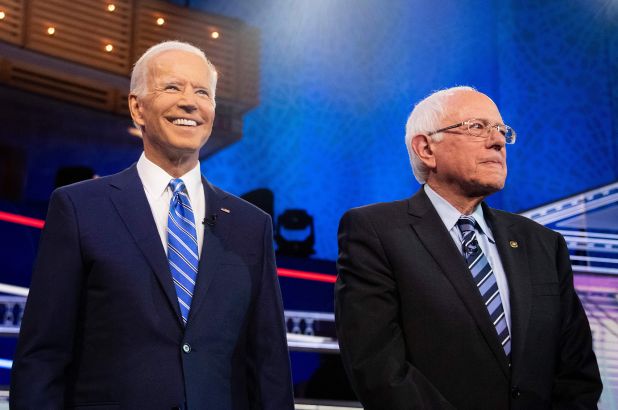OPINION: Moderate-progressive split dangerous for Democrats
by Kerry Boyd Anderson
Progressives and moderates mutually worry that members of the other group will not turn out to vote if their candidate becomes the nominee.
As the race to be the Democratic Party’s presidential candidate in the US has shaken out in the last week, it has become clear that the remainder of the race will be a contest between the moderate and progressive wings of the party.
Before the July Democratic convention ends, Democrats voting in the remaining primaries and caucuses must choose between former Vice President Joe Biden and Sen. Bernie Sanders. The nominee will compete with Donald Trump for the White House in November’s elections.
Before Super Tuesday — a batch of state elections held on March 3 that account for around a third of all delegates — it was unclear which candidate would be the standard-bearer for the party’s moderates. Biden was competing closely with candidates such as Pete Buttigieg, Sen. Amy Klobuchar, and former New York City Mayor Mike Bloomberg for the moderate vote. Sanders held a strong lead in delegates, marking him as a serious contender and the face of the progressive movement.
However, following Biden’s big win on Feb. 29 in the South Carolina primary, Buttigieg and Klobuchar bowed out of the race and endorsed Biden. Moderate Democrats who had been split among several candidates then coalesced around Biden. As the dust settled from Super Tuesday, it became clear that Biden and Sanders are the main contestants, leading Bloomberg to drop out and endorse Biden.
The Democratic moderates’ focus on Biden reflects the discomfort that many of them feel about Sanders’ left-wing policies and populist rhetoric. Exit polls suggest that Biden did very well with voters older than 45, black voters, women, college graduates, and voters who identify as Democrats. Notably, in ideological terms, he won among voters who identified as conservative, moderate, and even as “somewhat liberal.”
Many moderates watched with concern earlier in the race when Sanders took the lead. Sanders has attacked the “Democratic establishment” in vague terms that seemed to include nearly all other candidates, including moderate candidates such as Buttigieg, who clearly are not part of a party elite. Such rhetoric by Sanders, combined with the disdainful language that some of his supporters use against moderates, is off-putting to moderates and many people who identify as Democrats. Furthermore, many moderate Democrats do not support Sanders’ policies, particularly on health care, and were looking for a moderate candidate who could beat Sanders for the nomination. In some states, such as Virginia, concerns about gun violence are a major motivating factor for Democratic voters, and Biden has a stronger history on this issue than Sanders.
Moderates now have a clear leader, but the race is not over. Sanders has a devoted following and significant campaign resources. In exit polls from Super Tuesday, Sanders did well with voters under the age of 45, Hispanic or Latino voters, party independents, and voters who prioritize voting for someone with whom they agree. Sanders did very well with voters who identify as “very liberal.”
While Biden supporters tend to be pragmatists, a big part of Sanders’ appeal is his long-time consistency on many ideological and policy issues. Many voters, especially younger ones, like his authenticity and calls for dramatic change. The recession that began in 2008 was particularly scarring to young Americans, with many supporting Sanders’ calls for single-payer health insurance, tuition forgiveness, and free public university education. They want big, systemic change — not incremental reform. Sanders’ campaign also actively reached out to Hispanic communities.
Another factor shaping support for Biden or Sanders is whether voters see them as likely to win against Trump. Polling suggests that this was a strong priority for voters who chose Biden on Super Tuesday. Biden is more likely to put together the type of voter coalition that has helped Democrats win in the past, and polling from key Electoral College states showed him doing the best of the Democratic candidates in a head-to-head race against Trump. Sanders argues that he can turn out demographics that usually do not vote in large numbers, such as young people and Hispanic Americans. While the evidence that this is a winning strategy is thin, polling in key Electoral College states showed Sanders only slightly behind Biden in competing against Trump.
The concept of a moderate-progressive divide in the Democratic Party is useful to understanding the current race but also papers over important nuances. Sen. Elizabeth Warren’s campaign highlighted how the moderate-progressive dichotomy is overly simplistic. Her supporters included progressives who back a leftist policy agenda but dislike aspects of Sanders’ candidacy, as well as voters who want to vote for a woman or who fall somewhere in between progressive and moderate. Warren withdrew from the race after Super Tuesday and it is unclear for whom her supporters will now vote.
A danger for Democrats is that a long, drawn-out struggle between Biden and Sanders could leave whoever becomes the nominee bloody and bruised before even facing Trump directly. Progressives and moderates mutually worry that members of the other group will not turn out to vote if their candidate becomes the nominee. Trump is already trying to leverage the divide to damage his potential opponent. To win, the Democratic Party must find a way to unify its different parts. While disdain for Trump will ensure many on the left turn out to vote against him, negative partisanship alone might not be sufficient. The eventual Democratic Party nominee will have to work hard to reach out to the voters who are unhappy that he is leading the party.
Kerry Boyd Anderson is a writer and political risk consultant with more than 16 years’ experience as a professional analyst of international security issues and Middle East political and business risk. Her previous positions include deputy director for advisory with Oxford Analytica and managing editor of Arms Control Today. Twitter: @KBAresearch
Article first published on Arab News.



